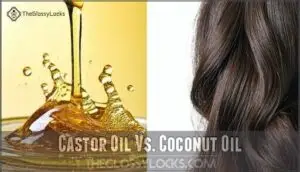This site is supported by our readers. We may earn a commission, at no cost to you, if you purchase through links.

It penetrates deeper into your hair shaft, delivering moisture where it counts most. While castor oil sits on your hair’s surface with its thick consistency, coconut oil’s unique molecular structure allows it to actually enter the strand, preventing breakage from the inside out.
You’ll also benefit from coconut oil’s antimicrobial properties that keep your scalp healthy. Castor oil has its merits with ricinoleic acid that may boost circulation, but coconut oil’s proven ability to reduce protein loss makes it the more reliable choice.
The real game-changer lies in understanding how each oil’s molecular makeup affects your specific hair type and growth goals, which is crucial for making an informed decision between coconut oil and castor oil for your hair care needs.
Table Of Contents
- Key Takeaways
- Which Better Castor Oil or Coconut Oil for Hair Growth?
- Castor Oil Vs. Coconut Oil
- Moisturizing Capabilities
- Scalp Nourishment
- Application and Frequency
- Absorption and Effectiveness
- Hair Strengthening Properties
- Cultural Significance and Considerations
- Frequently Asked Questions (FAQs)
- Which is better castor oil or coconut oil?
- Does castor oil promote hair growth?
- Does coconut oil promote hair growth?
- What are the benefits of castor oil & coconut oil?
- How to mix castor oil with coconut oil?
- What’s the best oil for hair growth?
- Does castor oil really regrow hair?
- Will my hair grow faster with castor oil?
- What oil is best for hair growth?
- Which oil is better than castor oil for hair?
- Conclusion
Key Takeaways
- You’ll get better results with coconut oil for overall hair health since it penetrates deeper into your hair shaft, preventing protein loss and breakage from the inside out, while castor oil mainly sits on the surface.
- Coconut oil’s antimicrobial properties keep your scalp healthier and create better conditions for growth, whereas castor oil’s ricinoleic acid may boost circulation but has limited scientific backing for actual hair regrowth.
- You can use coconut oil more frequently as a daily treatment due to its lighter consistency and superior absorption, while castor oil’s thick texture works best as a weekly intensive treatment for scalp stimulation and circulation benefits.
- You’ll maximize your hair growth potential by combining both oils – using coconut oil for daily protection and moisture retention, and castor oil for weekly scalp stimulation and circulation benefits.
Which Better Castor Oil or Coconut Oil for Hair Growth?
When you’re choosing between castor oil and coconut oil for hair growth, you’re basically picking between two champions with different strengths.
Castor oil brings serious muscle to the table with its ricinoleic acid, which boosts blood circulation to your scalp and creates the perfect environment for new growth. Think of it as your hair’s personal trainer.
Ready to transform your hair? Castor oil is the personal trainer your follicles have been waiting for.
Coconut oil, on the other hand, acts like a protective shield. It penetrates deep into your hair shaft, preventing protein loss and keeping strands strong. While Scientific Evidence shows coconut oil excels at moisture retention, castor oil benefits lean toward actual growth stimulation.
User Experiences often favor combining both oils in DIY Oil Blends for maximum impact. Your choice depends on whether you need growth acceleration or strand protection.
Castor Oil Vs. Coconut Oil
You’re likely wondering which oil works better for growing your hair, and the answer depends on what your hair needs most.
Castor oil contains ricinoleic acid that may stimulate hair follicles and increase blood flow to your scalp, while coconut oil strengthens existing hair strands and prevents breakage that can make your hair appear thinner.
Properties for Hair Growth
Both oils pack powerful properties that fuel hair growth through different mechanisms.
Castor oil delivers ricinoleic acid, boosting scalp circulation and fighting inflammation.
Coconut oil provides MCFAs that penetrate deeply, preventing protein loss.
| Property | Castor Oil | Coconut Oil |
|---|---|---|
| Key Fatty Acids | Ricinoleic acid (90%) | Lauric acid, capric acid |
| Hair Thickness | Omega-9 benefits strengthen strands | MCFAs effects reduce breakage |
| Scalp Circulation | Enhanced blood flow | Moderate improvement |
| Penetration | Surface coating | Deep shaft penetration |
Each oil’s unique fatty acids target hair growth differently.
Effectiveness in Promoting Hair Growth
When comparing effectiveness for hair growth, both oils deliver results through different mechanisms.
Castor oil’s ricinoleic acid boosts blood circulation to hair follicles, potentially accelerating growth. Coconut oil strengthens strands and prevents breakage, creating longer-looking hair.
However, scientific evidence remains limited for both oils’ direct growth-promoting abilities.
As an inexpensive and accessible option, castor oil is gaining traction.
| Factor | Castor Oil Hair | Coconut Oil Hair |
|---|---|---|
| Growth Mechanism | Ricinoleic acid stimulates follicles | Prevents breakage, maintains length |
| Scalp Health | Anti-inflammatory properties | Moisturizing fatty acids |
| Scientific Evidence | Limited research available | Protein loss prevention proven |
Differences in Hair Growth Benefits
When comparing hair growth oils, each brings distinct advantages to your hair care routine.
When choosing between hair growth champions, let your specific needs decide which oil becomes your hair’s new best friend.
Castor oil’s ricinoleic acid content directly stimulates follicle stimulation and boosts blood circulation, making it ideal for increasing hair thickness.
Coconut oil’s fatty acids focus on preventing breakage and maintaining existing hair health.
| Aspect | Castor Oil Hair | Coconut Oil Hair |
|---|---|---|
| Primary Action | Follicle stimulation through ricinoleic acid | Breakage prevention via fatty acids |
| Hair Thickness | Increases thickness over time | Maintains current thickness |
| Blood Circulation | Enhanced scalp circulation | Moderate circulation improvement |
The castor vs coconut debate ultimately depends on your specific hair growth goals and current hair condition, which is influenced by the primary action of the oil.
Moisturizing Capabilities
When you’re choosing between castor oil and coconut oil for hair care, you’ll find that both oils contain fatty acids that moisturize your scalp and hair strands effectively.
Coconut oil absorbs more easily into your hair shaft due to its medium-chain fatty acids, while castor oil’s thicker consistency provides longer-lasting moisture protection.
Castor oil’s thicker consistency provides longer-lasting moisture protection for dry or damaged hair.
Moisturizing Hair and Scalp
Both castor and coconut oils excel at moisturizing, but they work differently on your hair and scalp. Castor oil’s thick consistency creates a protective barrier that locks moisture deep into your hair shaft, making it perfect for tackling stubborn dryness and flaky scalp conditions.
Meanwhile, coconut oil’s lighter texture allows for superior oil absorption, penetrating quickly to deliver scalp hydration where you need it most. Both oils contain fatty acids that aid in moisturizing the scalp and contribute to overall scalp health.
Your choice between castor vs coconut depends on your specific needs:
- Castor oil uses: Intensive moisture retention treatments and reducing scalp irritation
- Coconut oil benefits: Daily hydration and lightweight conditioning without heaviness
- Coconut oil uses: Regular moisturizing routines and frizz control
For dryness prevention, coconut oil wins for everyday use, while castor oil delivers powerful hydration benefits during weekly deep-conditioning sessions. Both oils support healthy hair follicles, but coconut oil’s versatility makes it ideal for consistent moisturizing routines.
Impact on Hair Health and Growth
Two key factors determine how effectively these oils impact your hair’s overall condition.
Hair follicle stimulation occurs when castor oil’s ricinoleic acid increases scalp blood flow, creating ideal conditions for growth.
Meanwhile, coconut oil’s lighter molecular structure guarantees superior oil absorption rates, delivering nutrients directly to your hair shaft.
Both oils address dandruff and growth concerns differently.
Castor oil’s anti-inflammatory properties calm irritated scalps, while coconut oil’s antimicrobial action prevents fungal buildup.
Regarding breakage and strength, you’ll notice castor oil forms a protective barrier around each strand, reducing mechanical damage during styling.
| Oil Type | Primary Benefit | Application Frequency |
|---|---|---|
| Castor Oil | Follicle stimulation | 2-3 times weekly |
| Coconut Oil | Deep moisturization | Daily to weekly |
| Combined | Holistic care | 1-2 times weekly |
This hair oil comparison shows that combining both maximizes your hair health potential through complementary mechanisms.
Scalp Nourishment
Your scalp needs proper nourishment to create the healthy foundation that supports strong hair growth.
Castor oil and coconut oil deliver essential nutrients through different mechanisms. Castor oil provides ricinoleic acid and omega-9 fatty acids that improve blood circulation to hair follicles.
Coconut oil supplies medium-chain fatty acids and vitamins E and K that prevent dandruff and maintain scalp health.
Nourishing The Scalp for Hair Growth
Your scalp’s health sets the stage for robust hair growth, much like fertile soil nurtures thriving plants.
Both castor oil and coconut oil deliver essential nutrients that support follicle health and optimize blood circulation to your scalp.
Here’s how these oils nourish your scalp for ideal hair growth:
- Scalp microbiome balance – Coconut oil’s antimicrobial properties help maintain healthy bacterial levels.
- Enhanced blood circulation – Castor oil’s ricinoleic acid stimulates circulation when massaged into scalp.
- Sebum production regulation – Both oils help balance natural oil production for healthier follicle environment.
Impact on Scalp Health and Hair Growth
When considering hair oil benefits, your scalp’s condition directly determines growth potential.
Castor oil’s ricinoleic acid delivers powerful follicle stimulation while reducing inflammation that blocks growth. Its anti-inflammatory properties excel at dandruff reduction, creating ideal conditions for hair thickness.
Coconut oil’s lauric acid provides superior oil absorption and scalp hydration, penetrating deeply to nourish follicles from within. Both oils support scalp health differently.
A healthy scalp is essential, as inflammation damages follicles.
| Factor | Castor Oil | Coconut Oil |
|---|---|---|
| Primary Benefit | Follicle stimulation | Deep hydration |
| Absorption Rate | Slower, surface coating | Fast, deep penetration |
| Anti-inflammatory | High (ricinoleic acid) | Moderate (lauric acid) |
| Best For | Thinning hair, growth | Dry scalp, maintenance |
Your hair growth success depends on matching oil properties to your specific scalp needs.
Application and Frequency
You’ll achieve better results when you apply these oils correctly and follow the right schedule for your hair type.
Castor oil works best when used once or twice weekly, while coconut oil can be applied more frequently as a pre-shampoo treatment or leave-in conditioner.
Best Practices for Applying Castor Oil
Getting castor oil right requires a strategic approach that maximizes its hair growth potential.
This thick, amber-colored oil can feel like molasses if you don’t prepare it properly, but the payoff is worth the extra effort.
Here’s your step-by-step application guide:
- Prepare Your Mixture: Mix castor oil with a lighter carrier oil using a 1:1 dilution ratio. Coconut oil works perfectly as your mixing partner. Warm the blend slightly for better absorption.
- Apply With Precision: Use application tools like a dropper bottle or your fingertips to section your hair. Focus your hair oil massage on the scalp, using circular massage techniques to boost blood circulation.
- Time It Right: Leave the treatment on for 2-4 hours or overnight. Always perform patch testing first to avoid reactions, then use gentle removal methods with sulfate-free shampoo. To guarantee superior quality, consider using cold-pressed castor oil for its nutrient retention.
Best Practices for Applying Coconut Oil
Mastering coconut oil application transforms your hair growth journey through proper technique and timing.
Start with lukewarm oil temperature for better penetration. Use gentle circular motions during hair oil massage, focusing on your scalp and working down to hair tips.
Your hair type determines application frequency—fine hair needs less oil than thick, coarse textures.
Knowing the right method can improve overall product effectiveness.
| Step | Best Practice |
|---|---|
| Oil Temperature | Warm coconut oil slightly for enhanced absorption |
| Application Technique | Massage gently into scalp, then distribute through strands |
| Leave-in Duration | 30 minutes minimum, overnight for deep conditioning |
| Rinsing Methods | Use mild shampoo twice to remove all residue |
| Frequency | Apply 1-2 times weekly based on hair needs |
Absorption and Effectiveness
You’ll find that coconut oil absorbs into your hair shaft more easily than castor oil due to its lighter molecular structure, while castor oil’s thicker consistency means it sits on the hair surface longer.
The absorption difference affects how each oil works, with coconut oil penetrating deeper to strengthen hair from within and castor oil coating the exterior to protect against damage.
Absorption Rates and Impact on Hair Growth
Understanding how these oils work beneath the surface reveals why oil absorption matters for your hair journey.
Castor oil’s thick consistency means slower scalp penetration – think of it like a slow-release vitamin for your follicles. While coconut oil zips through your hair shaft quickly, castor oil takes its sweet time, providing sustained nourishment that supports follicle stimulation.
This rate difference isn’t necessarily a drawback. Your hair oil properties and porosity determine which approach works better. Fine hair might prefer coconut oil’s lighter touch, while damaged or coarse hair benefits from castor oil’s prolonged contact time.
The fatty acids in each oil interact differently with your scalp – coconut oil’s lauric acid penetrates fast, while castor oil’s ricinoleic acid works slowly but thoroughly. Some users explore options to improve castor oil absorption for enhanced benefits.
There’s no direct growth correlation with absorption speed alone. Sometimes slower penetration means better long-term results for hair growth.
Comparing Effectiveness for Hair Growth
Both oils show different strengths when you compare their hair growth effectiveness.
Hair oil studies reveal that castor oil’s ricinoleic acid content provides superior follicle stimulation, potentially boosting growth rate over time. However, hair thickness evidence remains limited for both options.
Coconut oil excels at breakage prevention and dandruff reduction, creating ideal conditions for healthy hair development.
Your results depend on consistent application and realistic expectations:
- Castor oil: Better for direct follicle stimulation and potential growth rate improvement
- Coconut oil: Superior for maintaining hair thickness through breakage prevention
- Combined approach: Many users find alternating between both oils maximizes benefits
Remember, neither oil works overnight magic, but regular use can improve your hair’s overall health and appearance.
Hair Strengthening Properties
When you’re dealing with weak, brittle hair that breaks easily, you need to understand how castor oil and coconut oil strengthen your hair strands differently.
Coconut oil penetrates the hair shaft and coats each strand to prevent breakage, while castor oil‘s ricinoleic acid nourishes your hair follicles and improves overall hair structure.
Strengthening Hair Strands
Your hair’s strength depends on how well these oils work at the molecular level.
Both castor oil and coconut oil offer unique strengthening mechanisms that protect your strands from damage.
Castor oil’s ricinoleic acid penetrates deep into your hair shaft, improving elasticity and providing keratin protection.
This creates stronger, more resilient strands that can handle daily styling without snapping.
Coconut oil excels at protein binding through its lauric acid content.
It forms a protective barrier around each strand, offering cuticle reinforcement that prevents moisture loss and environmental damage.
| Strengthening Factor | Castor Oil | Coconut Oil |
|---|---|---|
| Primary Mechanism | Ricinoleic acid penetration | Protein binding |
| Protective Action | Elasticity improvement | Cuticle reinforcement |
| Damage Prevention | Internal shaft strengthening | External barrier formation |
Regular use of either oil will give you stronger, more manageable hair that resists breakage and maintains its natural shine.
Impact on Reducing Breakage and Encouraging Growth
Strong hair doesn’t happen by accident.
Both castor oil and coconut oil work differently to minimize hair breakage while boosting growth potential.
Here’s how Oil Synergy creates stronger strands:
- Follicle Stimulation: Castor oil’s ricinoleic acid increases blood flow, awakening dormant hair follicles
- Hair Elasticity: Coconut oil penetrates deeply, improving flexibility and preventing snap-off
- Split End Reduction: Regular application seals cuticles, stopping damage from traveling upward
- Growth Factors: Combined anti-inflammatory properties create ideal scalp conditions for healthy hair development
Cultural Significance and Considerations
You’ll find that different cultures have used castor oil and coconut oil for hair care across generations, with specific traditions and preferences based on regional availability and ancestral knowledge.
Understanding these cultural practices can help you make informed choices about which oil aligns with your hair care goals and personal background, considering your hair care needs.
Cultural Implications of Oil Usage
Beyond the science lies a world where castor oil and coconut oil carry deep cultural weight. These aren’t just hair products—they’re threads woven into the fabric of generations.
Traditional hair care practices span continents, from Ayurvedic traditions in India to African beauty rituals passed down through families. Your grandmother’s oil rituals weren’t just about hair growth. They represented connection, heritage, and identity.
Global trade has made these traditional remedies accessible worldwide, but their religious significance remains profound in many cultures. Temple ceremonies often feature coconut oil, while castor oil appears in healing practices across various traditions.
| Cultural Aspect | Modern Impact |
|---|---|
| Oil rituals as bonding time | Family traditions continue today |
| Beauty standards vary by region | Influences product preferences |
| Traditional remedies gain scientific backing | Bridges ancient wisdom with modern research |
Understanding these cultural implications helps you appreciate why certain communities swear by specific oils. It’s not just about follicles—it’s about honoring ancestry while caring for your crown.
Considering Cultural Practices in Hair Care Choices
Understanding your cultural background can make all the difference when choosing between castor oil and coconut oil for hair growth.
Your ancestral practices and community influence often guide which traditional remedies work best for your hair type and scalp needs.
Here are four key cultural considerations for hair oiling decisions:
- Cultural Beliefs – Respect generational wisdom about which oils your family has used successfully for traditional hair care
- Traditional Remedies – Honor time-tested methods that align with your heritage while considering modern hair growth research
- Community Influence – Learn from others in your cultural group who’ve achieved results with specific oils
- Global Trends – Balance modern techniques with ancestral practices to create your personalized hair care routine
Your cultural lens helps you navigate between castor oil’s growth-promoting properties and coconut oil’s moisturizing benefits effectively.
Consider how styles like the Edgar cut embody a blend of cultural heritage and modern trends.
Frequently Asked Questions (FAQs)
Which is better castor oil or coconut oil?
Neither oil definitively wins the hair growth battle.
Castor oil’s ricinoleic acid may stimulate follicles, while coconut oil prevents breakage and strengthens strands.
You’ll likely see better results combining both oils rather than choosing just one, as this approach can lead to more effective hair growth by utilizing the benefits of both coconut oil.
Does castor oil promote hair growth?
Castor oil may promote hair growth through ricinoleic acid, which increases blood flow to your scalp.
However, scientific evidence remains limited.
You’ll likely see better results using it consistently twice weekly for several months.
Does coconut oil promote hair growth?
Picture your hair as a delicate garden needing protection rather than fertilizer.
Coconut oil doesn’t directly stimulate hair growth, but it prevents breakage by coating strands, creating an illusion of faster growth through healthier hair retention.
What are the benefits of castor oil & coconut oil?
You’ll get different perks from each oil.
Castor oil’s ricinoleic acid boosts blood flow and may stimulate follicles for growth.
Coconut oil strengthens strands, prevents breakage, and adds shine while moisturizing your scalp effectively.
How to mix castor oil with coconut oil?
Like a perfect recipe for hair success, you’ll want to warm coconut oil until liquid.
Then blend equal parts with castor oil. Mix thoroughly.
Apply to your scalp, massage gently, and leave for thirty minutes before shampooing.
What’s the best oil for hair growth?
Research shows castor oil’s ricinoleic acid stimulates follicles and boosts circulation for growth.
While coconut oil prevents breakage and strengthens strands.
You’ll get best results combining both oils for thorough hair health benefits.
Does castor oil really regrow hair?
Before telegraphs carried news, people waited months for answers—you’re seeking quicker clarity about castor oil’s hair regrowth claims.
Limited scientific evidence supports castor oil’s ability to regrow hair, though it may improve scalp health and circulation.
Will my hair grow faster with castor oil?
Your hair won’t grow markedly faster with castor oil alone.
While ricinoleic acid may improve blood circulation to your scalp, there’s limited scientific evidence proving castor oil actually accelerates hair growth rates.
What oil is best for hair growth?
Picture your scalp as fertile soil waiting for the right nutrients.
Castor oil takes the crown for growth, while coconut oil shines at protection.
You’ll see best results combining both oils weekly.
Which oil is better than castor oil for hair?
Coconut oil beats castor oil for overall hair health.
You’ll get better moisture retention, shine, and frizz control.
While castor oil might promote growth, coconut oil’s proven benefits make it superior for daily use.
Conclusion
Ready to make your final choice?
When determining which is better for hair growth, coconut oil emerges as the superior option for most people.
Its molecular structure penetrates hair strands effectively, reducing protein loss and preventing breakage from within.
While castor oil offers circulation benefits, coconut oil’s proven moisturizing capabilities and antimicrobial properties create ideal scalp conditions for healthy growth.
You’ll achieve better results by choosing coconut oil for your hair growth journey.
- https://www.researchgate.net/publication/9064590_Optical_properties_of_hair_Effect_of_treatments_on_luster_as_quantified_by_image_analysis
- https://www.sciencedirect.com/science/article/abs/pii/S0378874115301677?via%3Dihub
- https://pubmed.ncbi.nlm.nih.gov/20536483/
- https://abundantlyyou.wordpress.com/tag/coconut-oil-hair-treatment/
- https://www.health.com/castor-oil-for-hair-growth-8676327












